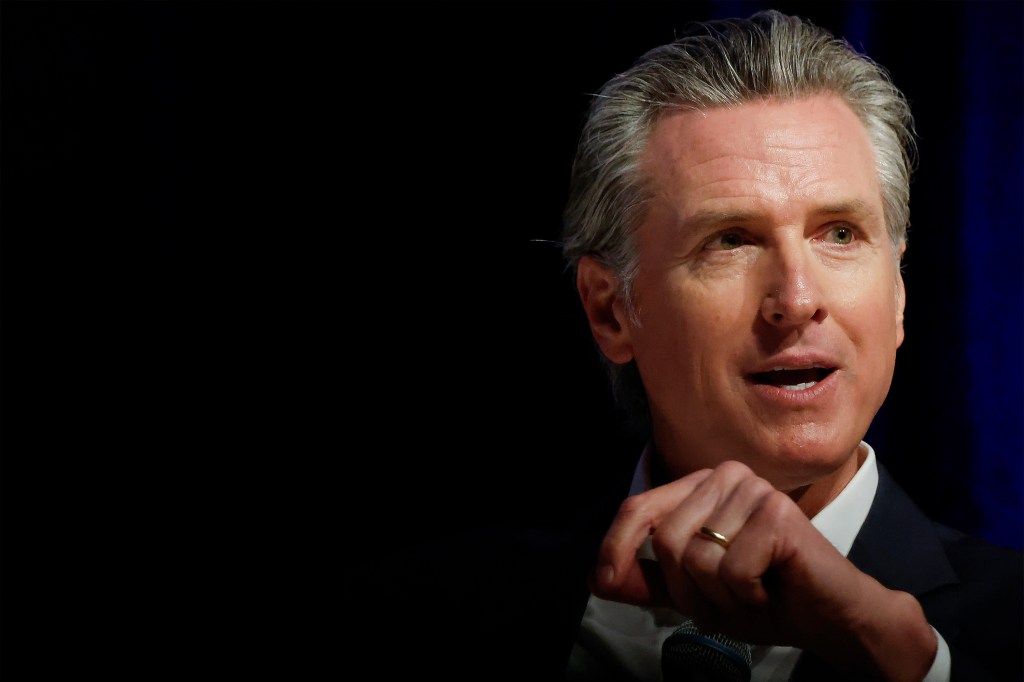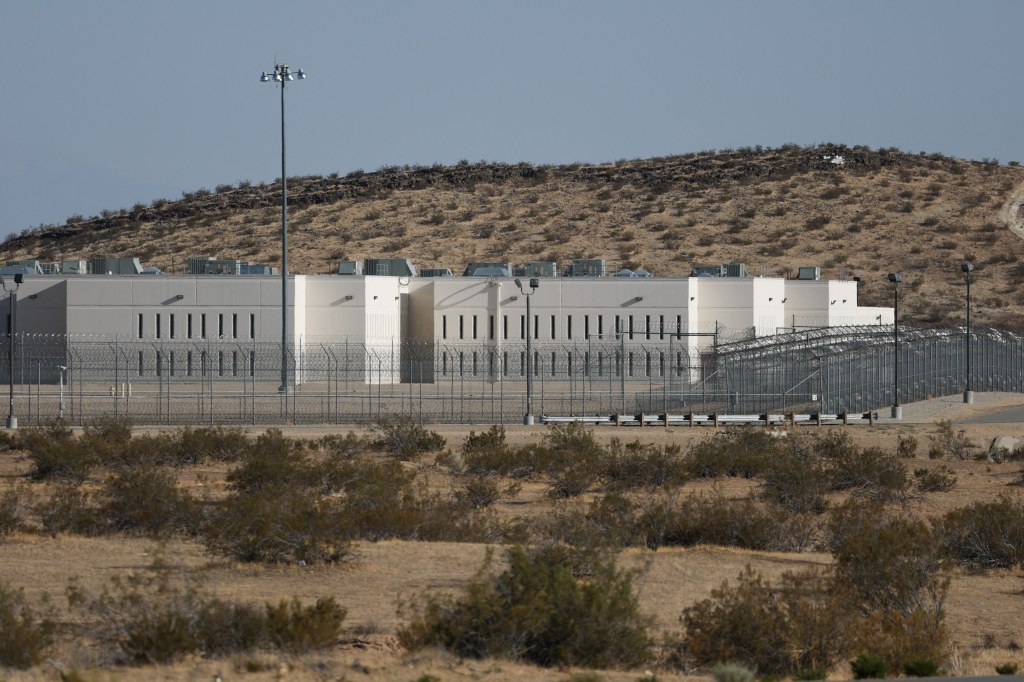SACRAMENTO — Gov. Gavin Newsom on Wednesday proposed that California roll back health care for immigrants without legal status, saying the state needed to cut benefits for some to maintain core services across the board.
It’s a striking reversal for the Democrat, who had promised universal health care and called health coverage for immigrants the moral and ethical thing to do. But a $12 billion state budget deficit, potential federal spending cuts, and larger-than-expected Medi-Cal enrollment have forced him to dial back.
Newsom said he had no other choice but to call for major cost-cutting measures effecting how some immigrants are covered by Medi-Cal, the state’s Medicaid program, which covers about 15 million Californians.
“The challenge that we face this year and the challenge we will face for many years is on growth of our Medicaid system, Medi-Cal,” Newsom told reporters at his budget presentation. “Instead of rolling back the program, cutting people off for basic care, we have to adjust the comprehensive nature of the care.”
California is one of seven states that offer health coverage to low-income adults regardless of immigration status, and that has put the program in the political crosshairs of national Republicans. The latest U.S. House proposal would cut Medicaid funding by 10 percentage points for states that provide coverage for immigrants without legal status — an approach Newsom on Wednesday described as legally questionable. Meanwhile, the Trump administration cited California’s health coverage of noncitizens as an example of states “gaming the system” when it issued a proposed rule Monday to overhaul Medicaid provider taxes.
Some 1.6 million immigrants — most without legal status — are enrolled in Medi-Cal. Federal law prohibits Medicaid dollars from being used to cover unauthorized residents, meaning California must foot the bill for the vast majority of their health care. And those costs have ballooned.
Newsom cautioned that California, like other states, could soon be in a more dire budget situation if Republicans advance their proposal to cut Medicaid. That plan includes work requirements and would cap taxes levied on providers that help states draw additional federal money. However, the governor’s budget proposal was silent on potential federal cuts.
The $321.9 billion budget proposes a freeze in Medi-Cal enrollment for immigrants 19 and older without legal status, starting Jan. 1. Beginning in 2027, immigrants 19 and older in the country illegally, as well as those with legal residency for fewer than five years, would be required to pay $100 monthly premiums to maintain coverage.
The Newsom administration estimated those two moves would save the state $5.4 billion by the 2028-29 fiscal year. The governor also called for eliminating dental and long-term care benefits for those without legal status and for legal residents who arrived in the U.S. fewer than five years ago, according to California Department of Finance spokesperson H.D. Palmer.
The changes would not apply to the roughly 217,000 children and young adults without legal status covered by Medi-Cal. Those 18 and under were the first to receive Medi-Cal coverage, in 2016. Children are generally healthier and require less care, and a KFF Health News analysis showed that, in many cases, children lacking legal status were cheaper to cover than citizens.
Maria, a street vendor from Los Angeles, said the monthly premium alone would force her and others to forgo care.
“They say they are one of the largest economies, but they don’t want to help us,” said Maria, who didn’t want to give her full name, out of fear of retaliation from immigration authorities. “We are contributing to the state. It’s not fair that we, the poor, have to pay what we don’t have.”
“Where am I going to get the $100?” Maria asked.
Federal law prohibits charging the poorest Medicaid enrollees a premium, and Newsom’s $100 monthly payment would be considered unaffordable for current beneficiaries, said Laurel Lucia, director of the health care program at the University of California-Berkeley Labor Center.
Newsom is proposing a $194.5 billion Medi-Cal budget for 2025-26. Lawmakers have until June 15 to pass the budget. Democratic leaders signaled their intent to protect health care for the state’s poorest residents.
The governor and Assembly Speaker Robert Rivas blamed fiscal headwinds brought on by President Donald Trump’s tariffs, which they said had led to a massive $16 billion dip in state tax revenue forecasts since April. But Medi-Cal spending surged well before the tariffs took effect. State costs to cover Californians with “unsatisfactory immigration status” — those without status and legal residents who have been here less than five years — is roughly $10.8 billion per year, up from the $6.4 billion officials projected in November. The federal government pays $1.2 billion of that to cover mandated emergency and pregnancy care.
“It’s laughable that he’s trying to blame Trump for anything,” Republican Assembly member Joe Patterson, who sits on the Assembly Budget Committee, said of Newsom. “He overpromised to them, and he’s pulling the carpet out from underneath them.”
Other states that have extended coverage to immigrants are also struggling with escalating costs. Minnesota, for example, originally projected that 5,700 residents without legal status would sign up for the state Medicaid program, known as MinnesotaCare, at a cost of $200 million. Both figures have increased roughly threefold.
Illinois is ending services for adult immigrants, except seniors, on July 1, citing higher-than-anticipated enrollment. The mostly state-funded health plan will stop covering around 30,000 noncitizens ages 42 to 64, including those living in the country without authorization.
Newsom said Wednesday that without a suite of his proposed changes to Medi-Cal, program costs could grow by an additional $10 billion through June 2026 and would “contribute significantly to the structural imbalance in future years.”
But consumer advocates and lawmakers said the move is a betrayal of the governor’s commitment to bring California closer to universal health care and warned it would push immigrants into costly emergency room care. Sen. María Elena Durazo, a Democrat who championed the Medi-Cal expansion, said California shouldn’t single out immigrants to solve its budget deficit.
“I don’t agree that we should be isolating and abandoning and separating a particular group of Californians, as if they are responsible for the problem,” Durazo said. “I don’t care what you call them, they work, they contribute.”
This article was produced by KFF Health News, which publishes California Healthline, an editorially independent service of the California Health Care Foundation.
KFF Health News is a national newsroom that produces in-depth journalism about health issues and is one of the core operating programs at KFF—an independent source of health policy research, polling, and journalism. Learn more about KFF.
USE OUR CONTENT
This story can be republished for free (details).








